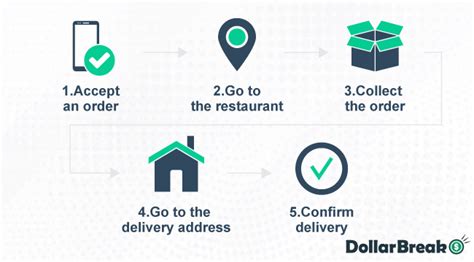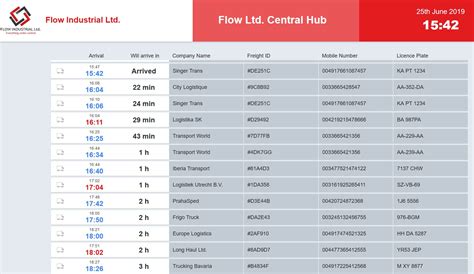Courier Jobs With Own Car

In the ever-evolving landscape of the gig economy, courier jobs have emerged as a popular choice for individuals seeking flexibility and the opportunity to be their own boss. With the rise of online shopping and the demand for fast, convenient deliveries, the courier industry has grown exponentially. One unique aspect of this industry is the option to work as a courier with your own car, offering an attractive prospect for those who want to utilize their personal vehicles for work. This article delves into the world of courier jobs with your own car, exploring the opportunities, requirements, and considerations for anyone interested in pursuing this career path.
The Appeal of Courier Jobs with Your Own Car

Courier jobs with your own car offer a range of advantages that make them an appealing choice for many individuals. Firstly, the flexibility these jobs provide is unparalleled. Unlike traditional 9-to-5 jobs, couriers have the freedom to choose their working hours, making it an ideal option for those with other commitments or a desire for a more dynamic work-life balance. Whether you’re a student looking to earn some extra income during your free time or a parent seeking a flexible career path, courier jobs can be tailored to fit your schedule.
Furthermore, the financial incentives can be significant. As a courier, you have the potential to earn a good income, especially if you work efficiently and build a solid reputation. Many courier platforms offer incentives and bonuses for completing a certain number of deliveries or achieving high customer satisfaction ratings. This performance-based pay structure can lead to substantial earnings over time.
The opportunity to be your own boss is another major draw. When you work as a courier with your own car, you have a sense of autonomy and control over your work. You decide when to work, which jobs to accept, and how to go about your daily tasks. This level of independence can be empowering and satisfying for many individuals, allowing them to take ownership of their career and make decisions that align with their personal goals and preferences.
Understanding the Requirements

While the prospect of becoming a courier with your own car is enticing, it’s essential to understand the requirements and considerations involved. Firstly, you’ll need to have a suitable vehicle that meets the necessary standards. Most courier platforms have specific vehicle requirements, such as a minimum age or model year, to ensure safety and efficiency. Additionally, your vehicle should be in good working condition, with valid registration and insurance.
Beyond the vehicle, there are personal requirements to meet. Typically, couriers need to be over a certain age, often 18 or 21, and have a valid driver's license. Some platforms may also require a clean driving record, with no serious traffic violations or accidents. It's crucial to check the specific requirements of the courier platform you're interested in, as they may vary.
In terms of skills and attributes, couriers need to be organized, reliable, and punctual. The ability to navigate efficiently and manage time effectively is essential, as you'll often be working against the clock to meet delivery deadlines. Additionally, excellent customer service skills are a must, as you'll be interacting with customers and representing the brand you work for. Being friendly, approachable, and able to handle customer inquiries and complaints is crucial for maintaining a positive reputation.
The Courier Platform: A Critical Choice
Choosing the right courier platform is a critical decision that can significantly impact your experience and earnings. With numerous options available, it’s essential to research and select a platform that aligns with your goals and preferences. Here are some key factors to consider when choosing a courier platform:
Payment Structure and Earnings
Different platforms offer varying payment structures. Some may provide a flat rate per delivery, while others might offer incentives based on distance traveled or the number of deliveries completed. Consider your financial goals and the type of work you prefer. If you’re looking for consistent earnings, a platform with a guaranteed minimum wage might be preferable. On the other hand, if you’re willing to take on more deliveries and work harder, a performance-based pay structure could be more lucrative.
Delivery Types and Specializations
Courier platforms often specialize in different types of deliveries. Some may focus primarily on food deliveries, while others might handle a wide range of items, including packages, documents, and even specialized cargo. Consider your preferences and skills. If you’re a foodie with a deep knowledge of local restaurants, a food delivery platform could be a perfect fit. Alternatively, if you enjoy the challenge of diverse deliveries and the opportunity to explore different parts of your city, a general delivery platform might suit you better.
Flexibility and Scheduling
Flexibility is a key advantage of courier jobs, but it’s essential to ensure the platform you choose offers the level of flexibility you need. Some platforms might require you to work during specific time slots, while others allow complete freedom to choose your working hours. Consider your personal schedule and the hours you’re available to work. If you have a busy lifestyle with varying commitments, a platform that offers complete scheduling freedom could be ideal.
Technology and Support
The use of technology and the level of support provided by a courier platform can significantly impact your experience. Look for platforms that utilize advanced technology for route optimization, real-time tracking, and efficient order management. Additionally, consider the level of support provided. A platform that offers 24⁄7 customer and driver support can be invaluable when you encounter issues or have questions. Platforms that provide resources for driver training and development can also be beneficial for your long-term growth and success.
Maximizing Earnings and Efficiency
To make the most of your courier job, it’s crucial to focus on maximizing your earnings and efficiency. Here are some strategies to consider:
Route Optimization
Efficient route planning is key to maximizing your earnings and minimizing time spent on the road. Utilize the technology provided by your courier platform to optimize your routes. Many platforms offer route optimization tools that consider factors like traffic, delivery locations, and order priority. By planning your routes effectively, you can complete more deliveries in less time, increasing your earnings and reducing fuel costs.
Time Management
Time is a valuable resource in the courier industry. Effective time management can help you complete more deliveries and improve your overall efficiency. Prioritize your tasks, and if possible, group deliveries together to minimize travel time between locations. Additionally, consider the time of day you work. Rush hours can be busy, but they also come with increased traffic and potential delays. Adjusting your working hours to avoid peak traffic times can help you maintain a faster pace and complete deliveries more efficiently.
Customer Satisfaction
Maintaining high customer satisfaction is crucial for your long-term success as a courier. Customers appreciate prompt, friendly service, so ensure you arrive at pickup and delivery locations on time. Keep communication open with your customers, providing updates on delivery status if needed. A friendly attitude and a willingness to go the extra mile can leave a positive impression and encourage repeat business. Remember, satisfied customers are more likely to rate you highly, which can lead to increased demand for your services and potentially higher earnings.
Safety and Maintenance Considerations

As a courier working with your own car, safety and vehicle maintenance are essential aspects to consider. Here are some key points to keep in mind:
Vehicle Safety and Maintenance
Regular vehicle maintenance is crucial to ensure your car remains in good condition and is safe to drive. Stay on top of routine maintenance tasks like oil changes, tire rotations, and brake inspections. Ensure your vehicle is equipped with all necessary safety features and that these features are in proper working order. Regularly check your car’s lights, signals, and brakes to ensure they function correctly. Additionally, keep an emergency kit in your car, including items like a spare tire, jumper cables, and a first aid kit, to be prepared for any unexpected situations.
Road Safety
Road safety is of utmost importance when working as a courier. Always follow traffic rules and regulations, and drive defensively to avoid accidents. Avoid distractions while driving, such as using your phone or eating, as these can impair your ability to focus on the road. Plan your routes carefully, taking into account road conditions and potential hazards. If you’re delivering to unfamiliar areas, consider familiarizing yourself with the route beforehand to minimize the risk of getting lost or encountering unexpected obstacles.
Insurance and Legal Considerations
Ensure you have the necessary insurance coverage for your vehicle. Check with your insurance provider to confirm that your policy covers you for commercial use, as personal auto insurance policies may not provide sufficient coverage for courier work. Additionally, familiarize yourself with the legal requirements for couriers in your area. Different regions may have specific regulations regarding courier operations, so ensure you’re aware of and compliant with these rules to avoid any legal issues.
Future Outlook and Opportunities
The future of courier jobs with your own car looks promising, with continued growth and evolution expected in the industry. As e-commerce continues to expand and the demand for fast, convenient deliveries increases, the need for couriers will likely rise. Additionally, technological advancements, such as improved route optimization tools and autonomous vehicles, could further enhance the efficiency and effectiveness of courier operations.
Furthermore, the rise of specialized courier services, such as same-day delivery and on-demand delivery, offers new opportunities for couriers. These services cater to specific customer needs and can provide couriers with the chance to specialize and develop expertise in a particular area. As the industry evolves, couriers who stay up-to-date with the latest trends and technologies will be well-positioned to take advantage of these emerging opportunities.
Conclusion: Embracing the Courier Lifestyle
Courier jobs with your own car offer a unique and appealing career path, combining flexibility, financial incentives, and the opportunity to be your own boss. By understanding the requirements, choosing the right courier platform, and focusing on maximizing earnings and efficiency, you can build a successful and rewarding career as a courier. With the continued growth of the industry and the emergence of new opportunities, the future looks bright for those embracing the courier lifestyle.
What are the average earnings for couriers with their own cars?
+Earnings can vary widely depending on factors such as the platform, location, and the number of hours worked. On average, couriers can expect to earn between 15 to 25 per hour, but with incentives and bonuses, earnings can exceed $30 per hour in some cases.
Are there any tax implications for working as a courier with my own car?
+Yes, as a courier, you are considered self-employed, which means you are responsible for paying your own taxes. It’s important to keep accurate records of your income and expenses to ensure you comply with tax regulations.
Can I work for multiple courier platforms at the same time?
+Yes, many couriers choose to work for multiple platforms to maximize their earnings and flexibility. However, it’s important to manage your time effectively and ensure you can meet the demands of each platform.
What are some common challenges faced by couriers with their own cars?
+Common challenges include traffic delays, navigating unfamiliar areas, and dealing with customer expectations. Additionally, maintaining your vehicle and ensuring it remains in good condition can be a continuous challenge.
Are there any tips for improving customer satisfaction as a courier?
+Absolutely! Focus on being punctual, maintaining a friendly and professional demeanor, and going the extra mile when possible. Regularly communicate with customers to provide updates and address any concerns they may have.

